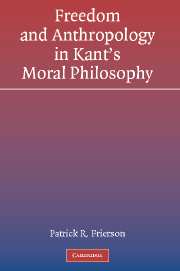Book contents
- Frontmatter
- Dedication
- Contents
- Preface
- Introduction: A Problem with Kant’s Moral Anthropology
- I The Problem
- 1 The Asymmetry in Kant’s Conception of Freedom
- 2 Anthropology as an Empirical Science
- 3 The Moral Importance of Kant’s “Pragmatic” Anthropology
- 4 Moral Anthropology in Contemporary Neokantian Ethics
- II The Solution
- 5 Transcendental Idealism, Radical Evil, and Moral Anthropology
- 6 Moral Influence on Others
- Epilogue: Incorporating Moral Anthropology and Defending Kantian Moral Philosophy
- Notes
- References
- Index of Kant’s Works
- Name Index
- Subject Index
Epilogue: Incorporating Moral Anthropology and Defending Kantian Moral Philosophy
Published online by Cambridge University Press: 28 July 2009
- Frontmatter
- Dedication
- Contents
- Preface
- Introduction: A Problem with Kant’s Moral Anthropology
- I The Problem
- 1 The Asymmetry in Kant’s Conception of Freedom
- 2 Anthropology as an Empirical Science
- 3 The Moral Importance of Kant’s “Pragmatic” Anthropology
- 4 Moral Anthropology in Contemporary Neokantian Ethics
- II The Solution
- 5 Transcendental Idealism, Radical Evil, and Moral Anthropology
- 6 Moral Influence on Others
- Epilogue: Incorporating Moral Anthropology and Defending Kantian Moral Philosophy
- Notes
- References
- Index of Kant’s Works
- Name Index
- Subject Index
Summary
Near the end of Kant's Impure Ethics, Robert Louden asks whether Kant is “saved by impurity” (Louden 2000:167). That is, he asks whether the anthropological and other “impure” elements of Kant's moral philosophy save it from the objections to which it has been subject over the past two centuries. In this book, my task has been more limited. I am convinced that Kant's moral anthropology strengthens his ethical theory. Kant rightly recognized the possibility of effecting changes in human agents, especially oneself. And he saw that these changes can be morally beneficial when they are directed to the cultivation of a good and strong character. One's moral status is not merely a matter of the choices that one makes about the present but involves the sort of person that one is. And becoming a certain sort of person involves cultivating and promoting certain dispositions, emotional responses, interactions with others, habits of thought and action, and social structures. These aspects of human life are clearly important parts of morality, and Kant's moral theory is stronger for having recognized them.
But Kant's moral theory is stronger for having recognized the importance of anthropology only if the theory remains consistent. The importance of freedom — both practical autonomy and the transcendental freedom which underlies that autonomy — is still the core insight of Kantian moral theory. Many moral philosophers have recognized the importance of anthropological considerations.
- Type
- Chapter
- Information
- Freedom and Anthropology in Kant's Moral Philosophy , pp. 163 - 166Publisher: Cambridge University PressPrint publication year: 2003



